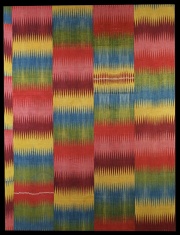Difference between revisions of "Ikat"
Jump to navigation
Jump to search
m (Text replace - "== Authority ==" to "== Sources Checked for Data in Record ==") |
|||
| Line 20: | Line 20: | ||
</gallery> | </gallery> | ||
| − | + | == Resources and Citations == | |
| − | == | ||
* ''Fairchild's Dictionary of Textiles'', Phyllis G.Tortora, Robert S. Merkel (eds.), Fairchild Publications, New York City, 7th edition, 1996 | * ''Fairchild's Dictionary of Textiles'', Phyllis G.Tortora, Robert S. Merkel (eds.), Fairchild Publications, New York City, 7th edition, 1996 | ||
| − | * ''Encyclopedia Britannica'', http://www.britannica.com Comment: "arts, Southeast Asian." | + | * ''Encyclopedia Britannica'', http://www.britannica.com Comment: "arts, Southeast Asian." and "Indonesia." (Accessed 30 Sept. 2004). |
[[Category:Materials database]] | [[Category:Materials database]] | ||
Revision as of 08:39, 20 October 2020
Description
A resist-dyed textile first prepared in Indonesia. Ikat textiles are primarily made from Cotton or Silk. Prior to weaving the thread is periodically tied then dyed thus preventing the tied section from being colored. The process is then repeated with different tie location and dye colors. In warp ikats, only the lengthwise threads are dyed. In weft ikats, dyed floating weft threads are woven in addition to the plain filling threads.
Synonyms and Related Terms
resist-dyed textile; weft ikat; warp ikat; patola (India); tie-dyed (modern term)
Additional Images
Resources and Citations
- Fairchild's Dictionary of Textiles, Phyllis G.Tortora, Robert S. Merkel (eds.), Fairchild Publications, New York City, 7th edition, 1996
- Encyclopedia Britannica, http://www.britannica.com Comment: "arts, Southeast Asian." and "Indonesia." (Accessed 30 Sept. 2004).







